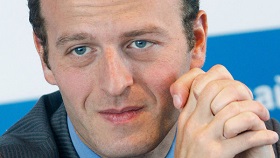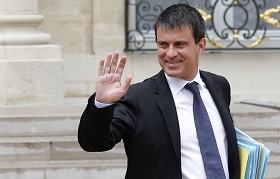Just 147 days after Manuel Valls’ nomination as prime minister at Hôtel Matignon, the cabinet of ministers in Paris faced a new reshuffle. Some believe it will rejuvenate the French economy, which seems mired in stagnation, but most doubt that scenario is a real possibility. François Hollande is rapidly becoming one of the French fifth Republic’s most criticized and mocked presidents. RIAC asked Thomas Gomart, Senior Research Fellow, Vice President for Strategic Development at IFRI, about the nature of the recent government changes and what they will bring.
Just 147 days after Manuel Valls’ nomination as prime minister at Hôtel Matignon, the cabinet of ministers in Paris faced a new reshuffle. Some believe it will rejuvenate the French economy, which seems mired in stagnation, but most doubt that scenario is a real possibility. François Hollande is rapidly becoming one of the French fifth Republic’s most criticized and mocked presidents. RIAC asked Thomas Gomart, Senior Research Fellow, Vice President for Strategic Development at IFRI, about the nature of the recent government changes and what they will bring.
What prompted the French Government to resign? What were the main problems?
The main problem is the internal criticism emanating from one of the appointed ministers, Arnaud Montebourg, who was the minister for the economy. He was publicly very critical of his government’s chosen policy. In addition, two other prominent ministers, Benoît Hamon, who oversaw education, and Aurelie Filipetti, responsible for culture, backed him publicly. The socialist party has seen intense debate between two different camps. The first is against what is often called the policy of austerity, i.e. a dramatic reduction in public spending and the budget deficit. The second camp, including Montebourg, Hamon, Filipetti and a few other socialist deputies, believe that there is a need to stop austerity and to be more flexible in terms of decreasing the public deficits given – according to them the absence of growth is down to austerity. They feel that there have been significant cuts but no growth. So essentially, this political crisis has been provoked by tensions within the socialist party. Arnaud Montebourg has been very vocal since his appointment, and decided to openly challenge François Hollande, to position himself as a leading figure. At the same time, and there is a long back-story here, the French socialist party remains divided over the concept of social-democracy.
So what are the prospects for the future government? How will it cope with all the problems and criticism? Are there any prospects for future economic development?
Sure, there are prospects for the future of our economic development. It is important to remember, especially in Russia, that France boasts some economic disadvantages, but also some strong economic assets. There is a traditional spirit of entrepreneurship, significant savings are in private hands. The problem is the level of state spending in comparison to other western countries. France carries a much heavier public spending burden than other Eurozone countries. But that said, the country also boasts some very strong global companies, there are also some sectors of excellence. Internationally, the situation is often portrayed as being weird even if there is no growth, and the perception of relative decline remains. But this economy is very robust in some areas. That said, we certainly have an economic problem related to what I said about the public deficit. There is no doubt about that. These problems should be contained and there is a convergence between the current government and the economic elites over the need to do so.
So what is the first positive step? Coming from the socialist party, this government now has a much narrower political base in parliament. So the question is whether the political support demonstrated by François Hollande and Manuel Valls will translate into the parliament. Overtures have certainly been made toward the business community. Tensions between the state and the business community were quite high because of superfluous regulation and excessive public spending. To some extent, one of the main political mistakes coming from this change of government is that the state does consider enterprises the main players in creating jobs, not the state.
How does the resignation of the French government affect relations with other countries, such as Russia? Will the resignation have an effect? And if so, how will it affect relations?
I think that relations between France and Russia will change dramatically in the coming months, but it won’t be due to the new government. It will be related to Russia’s behavior in Ukraine. So, it is not at all a question of the new team in France. It is now a question of Russia’s positioning on the international scene and the decisions taken by the Kremlin relating to Europe. Certainly, relations between France and Russia will be more tense – and I think this will not only be the case between France and Russia. On the one hand, the situation will be complicated for all the European companies involved in Russia. On the other hand, it will be very tricky for Russia to deal with its main European partners. So, the point is not a question of the current team, but the real situation depends on Russia’s policy.
So there will be virtually no difference in the stance of the current, outgoing, government and that of the incoming government regarding Russia?
The point is: don’t expect relations to change because of the new team in France. It is not a question of the French team. Once again, I think it will be dependent on the behavior of Russia.
Interviewed by Ilya Ivanov, RIAC program assistant.





